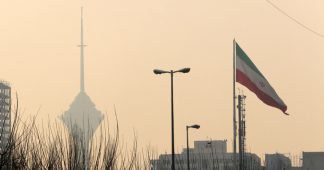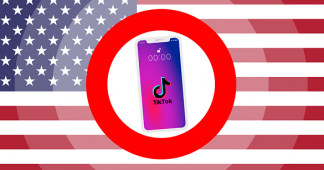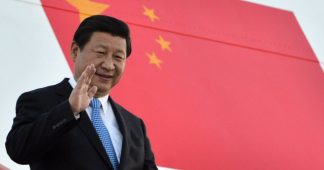September 9, 2021
Over the past year, the Chinese government has embarked on a wide-ranging, severe, and unprecedented onslaught of its technology industries along with an array of powerful business interests.
In many ways, the crackdowns reinforce the essential traits of the Chinese Communist Party on the centenary of its founding: its commitment to ideological conformity and intolerance of regime challenges. Yet much of the activity, seemingly directed by the top leader, Xí Jìnpíng 习近平, and his Common Prosperity agenda, is driven by the need to address the extreme wealth inequality that came with four decades of capital-fueled growth.
“Red New Deal” captures some of what is going on here: The government is promising to reduce inequality and make life better for ordinary people, and many of the moves seem to have genuine popular support. It’s red because the actions have old-fashioned communist rationale, but also because companies that get in the way of the government are going to bleed.
We summarized some of the major themes of the crackdowns at the beginning of August, but the government’s targets expanded so dramatically in the following month that we made this new guide to keep track.
There are at least 19 different crackdowns going on in China right now, according to our running list. Click on the name of one to skip to that section:
- Fintech companies
- Ecommerce and social media companies
- Celebrity and fan club culture
- High-income individuals who avoid taxes, or make “excessively high incomes”
- Tutoring and education companies, private schools
- Gaming companies
- Ride-sharing, car-hailing, bike-sharing, and power-bank-sharing companies
- Companies that want to IPO in the U.S.
- Companies that make heavy use of algorithms
- Cloud computing firms that sell services to state and Party organizations
- Bitcoin miners and crypto exchanges
- Real estate companies and landlords
- Private investment funds
- Online insurance providers
- Online short-term rental platforms
- Cosmetics and packaged food brands
- High-frequency stock traders
- Virtual reality
- Casinos
1. Fintech companies

Perhaps the first casualty of the entire crackdown was Beijing’s suspension of Ant Group’s IPO in November following Alibaba CEO Jack Ma’s speech at the Bund Financial Summit, in which he compared global banking regulators to “an old man’s club.” Ant Group promised to democratize the accessibility of loans to all Chinese, but opponents say that the company was engaging in predatory lending and abusing its market position. (Along with Tencent, Ant is part of a duopoly that virtually controls mobile and digital payments in China.)
Since then, banking regulators have forced Ant Group to restructure as a financial holding company and spin off its consumer credit data operations. They have also called on Ant to help develop a state-backed digital currency, threatening the company’s popular payment networks. On October 20, the registration for Ant’s erstwhile $35 billion IPO expired. Some estimate it will not return to market before 2023.
2. Ecommerce and social media companies

Regulators have come down on China’s largest ecommerce and social media companies for abusing their market dominance.
Alibaba became the first and largest victim when it was fined a record $2.8 billion on April 10. Three days later, 34 of China’s biggest platform companies were called in by antitrust regulators to rectify monopolistic practices, including Tencent (social media), Meituan (ecommerce), Baidu (search), ByteDance (social media), and JD (ecommerce). In the following months, SAMR has fined almost all of these companies for failing to disclose mergers, signing exclusive contracts, misleading marketing tactics, and other “merger irregularities.”
Ecommerce companies have also been the main target of regulations aimed at protecting the rights of workers. Months after a September 2020 exposé (in Chinese), which detailed the exploitative working conditions of delivery workers, Xí Jìnpíng 习近平 vowed to protect “the legitimate interests of truck drivers, couriers, and food delivery riders.” Regulators have since issued a number of rules, including ordering online food platforms to ensure their workers earn at least the local minimum wage. Six major parcel delivery companies in late August announced they would increase delivery fees to boost couriers’ incomes.
3. Celebrity and fan club culture

China has taken harsh measures to curb what it describes as “chaotic” celebrity fan culture, amid growing concerns among officials that pop stars and actors are poisoning the minds of Chinese youths. The Cyberspace Administration of China has banned (in Chinese) the ranking of celebrities by popularity. In May, a popular idol group show was shut down by officials after a video (in Chinese) surfaced in which fans of the show were dumping milk into ditches in a dairy marketing campaign gone wrong. In September, Weibo, the popular social media app, announced bans on 21 K-pop fan accounts for a month after photographs of a customized airplane funded by a fan club of South Korean K-pop band BTS emerged online.
Other measures evince Beijing’s bugbears, such as the clampdown on artists with “incorrect political positions” or men who were insufficiently masculine from TV shows and movies.
4. High-income individuals who avoid taxes, or make “excessively high incomes”

In August, the same day Xi Jinping made a speech calling for the promotion of “common prosperity,” he also called for China to “clean up and adjust excessively high incomes.” Ten days later, the State Taxation Administration announced a probe into people who have avoided taxes. Regulators have already fined a number of pop stars and actors for tax evasion and have even ordered broadcasters to wipe the content of blacklisted celebrities — their names and faces — from the Chinese internet. The most high-profile targets so far include the actresses Zhào Wēi 赵薇 and Zhèng Shuǎng 郑爽.
5. Tutoring and education companies, private schools

China’s regulators made international headlines in July when they banned its sprawling $100 billion tutoring sector from raising capital and going public. The measures come amid growing concerns that education has become an expensive rat race with no reward for average people.
Officials also see the exorbitant cost of education as a potential obstacle to new Party plans to increase China’s birth rates. In March, Xi Jinping told members of an education committee that the tutoring industry placed undue burdens on children and mentioned the sector as an example of “disorderly development” (in Chinese). Tutoring companies must now register as nonprofits by the end of the year. Since the law came down, shares of China’s largest education company, New Oriental Education, have dropped 80%, and many tutoring companies have gone out of business.
The tutoring crackdown is also linked to wider reform of China’s private compulsory education sector, including by restricting profiteering in private education, banning foreign ownership of private schools, and trying to reduce the proportion of private school enrollments.
Regulations have also tried to sever the link between expensive homes and good schools. After regulators announced they would not guarantee school placements based on home proximity, purchases of school-district homes in several cities plummeted.
The squeeze on private education and tutoring has continued into October: OneSmart Education, one of the U.S-listed Chinese after-school tutoring companies that was thrown into turmoil by the private tutoring ban, announced bankruptcy on October 12. The Ministry of Education swiftly issued guidelines to help upset parents get refunds for tuition fees. Two weeks later on October 25, another domino fell: Online education group Koolearn Technology, a subsidiary of pioneering education firm New Oriental, said “that they will stop offering subject-based off-campus training services for students of K-9.”
Beijing has continued to issue new guidelines and laws to reshape China’s education-industrial complex. A notice issued by the Central Committee and State Council on October 12 prompted a stock rally among Chinese education companies, as its emphasis on expanding on standardizing vocational education promised to offer a way for tutoring companies to pivot. On October 23, Beijing said that it had passed an education law “that seeks to cut the ‘twin pressures’ of homework and off-site tutoring in core subject.”
6. Gaming companies

Since 2018, China has taken aggressive aim at gaming giants Tencent and NetEase, halting approval for new companies and issuing draconian gaming curfews for minors. Over the summer, the scrutiny returned. A state media article in August described video games as “spiritual opium.” That same month, China issued one of its more stringent policies yet on how long minors can play online video games. The National Press and Publication Administration banned players under 18 from playing more than three hours a week — and only between 8 p.m. and 9 p.m. on Friday, Saturday, and Sunday. The rules come after recent revisions to the Minors Protection Law meant to prevent Chinese youth from internet addiction.
In September, Beijing slowed down approvals for new video games, and later released guidelines that new games must follow socially conservative rules, such as requiring that male characters dress and act like stereotypical men.
7. Ride-sharing, car-hailing, bike-sharing, and power-bank-sharing companies

China’s antitrust regulators have tightened their supervision of the giants of the sharing economy. In late August, the State Administration for Market Regulation began investigating recent mergers in the power-bank-sharing industry, which dispenses portable phone chargers for rent across China’s major cities. In June, eight enterprises in the sharing economy were ordered to rectify prices after they suddenly hiked prices following years of growth and market consolidation. Some other companies such as ride-hailer Didi have also faced regulatory scrutiny over data security. The Alibaba-backed Hello, a bike-on-demand firm, also abruptly suspended its plans for a U.S. IPO in late July for unknown reasons.
8. Companies that want to IPO in the U.S.

China has tightened its screws on domestic companies trying to list overseas amid data security concerns and mounting regulatory pressures from the U.S. Two days after ride-hailing app Didi’s IPO in the U.S., the Cyberspace Administration of China suspended its app for violating data security protocols. The probe then widened, and app freezes fell on two other U.S.-listed Chinese companies: freight-logistics app Full Truck Alliance and recruiting platform Kanzhun.
Regulators have since worked to patch a loophole in which Chinese tech companies have historically gone public overseas — known as a VIE structure. It has also sought to implement and clarify its newly passed Data Security Law (DSL), which came into effect in September. China is reportedly planning to propose new rules that would outright ban companies with large amounts of sensitive consumer data from going public in the U.S.
Despite all the hurdles, it seems many Chinese companies are still willing to push ahead with Wall Street dreams. In October, the Ministry of Industry and Information Technology (MIIT) published draft regulations which define “core data,” as data that poses a “serious threat” to China’s national and economic interests. Organizations may “self-assess” the security of ordinary data, but must conduct annual assessments at least once each year.
9. Companies that make heavy use of algorithms

China has issued unprecedented rules to stop tech companies from abusing recommendation algorithms. The new cyberspace guidelines (in Chinese) evince political and ideological motives — such as old-fashioned censorship — but many of them also resemble arguments leveled against Big Tech in the West. They include limitations on keywords, protections for minors, greater transparency, and better worker protections for couriers whose delivery schedules are made by machines. Algorithms are also prohibited from engaging in differential treatment based on consumer preferences and characteristics.
10. Cloud computing firms that sell services to state and Party organizations

As part of Beijing’s sweeping Data Security Law meant to ensure sovereignty over its data, the government’s state assets watchdog in Tianjin has ordered its state firms to migrate cloud services from tech giants like Alibaba and Tencent to the government’s own infrastructure. Firms owned by the municipal government were also barred from renewing or signing new leasing contracts with public cloud platforms owned by Huawei, Alibaba, Tencent, China Unicom, China Mobile, and China Telecom, according to Chinese media reports.
11. Bitcoin miners and crypto exchanges

China has banned bitcoin mining as part of a wider crackdown on speculative investments and energy-intensive industries. Inner Mongolia became the first province in March to implement a thorough ban. That intensified in June, when four more regions — Qinghai and Xinjiang, then Yunnan, and finally, Sichuan — announced plans to cut power supply to bitcoin mining operations leading to the shutdown of more than 90% of China’s bitcoin mining capacity. A June notice (in Chinese) by the central bank said that cryptocurrency trading “disrupts normal economic and financial order” and can facilitate money laundering and other crime. In late September, China’s financial and securities regulators initiated a blanket ban on cryptocurrency transactions and mining.
The country has had a firm stance against cryptocurrencies for many years. In 2013, China’s central bank barred financial institutions from handling cryptocurrency transactions after its price jumped tenfold in the span of a few months. In 2017, it also banned fundraising through initial coin offerings and shuttered domestic bitcoin exchanges. Chinese miners, which accounted for as much as 70% of crypto mining worldwide, have now been driven out of China. Some of them have relocated overseas to Kazakhstan, Russia, and Texas.
12. Real estate companies and landlords

Beijing has sharpened its oversight of the country’s red-hot real estate market. In June, eight government departments vowed to clampdown on speculative borrowing, stressing that “housing is for living in, not for speculation.”
The campaign to rein in unruly debt ramped up in August 2020 when regulators imposed the “three red lines,” which capped borrowing and forced developers to offload properties at increasingly steep discounts. That led to a liquidity crisis at China’s largest property developer Evergrande. The conglomerate is close to bankruptcy, which may slow down the entire global economy.
Shenzhen is also a sandbox for new real estate regulations. There are rules limiting deposits to a maximum of one month’s rent, along with price caps on land. In August, the China Banking and Insurance Regulatory Commission launched a probe into the real estate arm of Shenzhen-based Ping An Insurance Group, one of the country’s most prominent financial firms. Regulators asked Ping An to halt the sale of alternative investment products, leaving dozens of teams out of work.
Xi Jinping has also pushed through a controversial and long-dismissed property tax to act as another coolant. On October 23, China’s legislature authorized a five-year pilot program in select regions. It’s no small feat that Xi was able to pass the tax a week after “overwhelmingly negative” feedback was reported among “elites and rank-and-file members.”
All of this has alarmed investors. Analysts at Bank of America, for example, are saying that the credit squeeze in the property sector is “unnecessarily aggressive” and may weigh on industrial demand and consumption. Beijing has a tight rope to walk, as it tries to stabilize its property sector without imperiling a vital sector of the economy — the industry accounts for more than 28% of gross domestic output.
13. Private investment funds

China’s top securities regulator said that it will rein in the country’s private equity and venture capital funds, per Bloomberg.
The chairman of the China Securities Regulatory Commission said in a speech that the government is dedicated to rooting out embezzlement and public equities masquerading as private equities.
14. Online insurance providers

The China Banking Regulatory Commission (CBRC) is going to target the country’s growing online insurance sector, according to Shanghai Securities News (in Chinese, or see this Reuters report).
15. Online short-term rental platforms

Several government agencies summoned nine short-term rental platforms, including Airbnb and its major Chinese competitors, for a meeting on August 20, ordering the platforms to remove listings for properties in Beijing.
16. Cosmetics and packaged food brands

China has sought to increase oversight over packaging and labeling in the rapidly growing food and cosmetics industries. In September, China’s regulators issued new guidelines (in Chinese) to prevent excessive packaging for food and cosmetic products. The rules follow a series of regulations earlier in the year that aims to prevent misleading labeling and product information in the cosmetics industry.
17. High-frequency stock traders

Quantitative trading — a sector that has grown rapidly alongside China’s stock market — should be regulated in a way that “best suits” the country, per the state-run Securities Times (in Chinese).
In 2020, Chicago-based high-frequency trading firm Citadel Securities agreed to pay a $97 million settlement for alleged trading irregularities during a 2015 market rout in China.
18. Virtual reality

China’s consumer tech sector is rushing headlong into VR even amid regulatory fire. “Metaverse,” a 3D space based on virtual reality and augmented reality technology, has become a new fad among Chinese tech companies ever since it was popularized by Facebook’s Mark Zuckerburg in July. ByteDance bought China’s biggest VR headset maker in a push to enter the field in August and two Chinese internet companies announced plans to develop metaverse products in September, sending their Shenzhen-listed stocks surging 100% and 50%, respectively. That has apparently alarmed regulators. A commentary in state-owned Security Times days later denounced the technology as a “grand and illusionary concept.” Investors, it read, “will be burnt in the end.” Nevertheless, investors press on into the sector: Beijing-based Nreal, an augmented reality technology company, announced on September 23 that it had completed a Series C funding round of over $100 million.
19. Casinos

China is ramping up its scrutiny of casinos in Macao, the only place in the country where gambling is legal. Officials said in mid-September that they would tighten restrictions on casino operators, including appointing government representatives to “supervise” them. Lei Wai Nong (李偉農 Lǐ Wěinóng), Macau’s secretary for economy and finance, issued a 45-day consultation period on the gambling industry pointing to deficiencies in industry supervision. Macao’s casinos, which must all rebid for licenses when permits expire in June 2022, now face an uncertain future. $18 billion evaporated from casino stocks immediately after the news.
Published at supchina.com
We remind our readers that publication of articles on our site does not mean that we agree with what is written. Our policy is to publish anything which we consider of interest, so as to assist our readers in forming their opinions. Sometimes we even publish articles with which we totally disagree, since we believe it is important for our readers to be informed on as wide a spectrum of views as possible.











